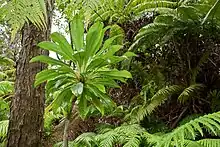| Clermontia montis-loa | |
|---|---|
 | |
| Scientific classification | |
| Kingdom: | Plantae |
| Clade: | Tracheophytes |
| Clade: | Angiosperms |
| Clade: | Eudicots |
| Clade: | Asterids |
| Order: | Asterales |
| Family: | Campanulaceae |
| Genus: | Clermontia |
| Species: | C. montis-loa |
| Binomial name | |
| Clermontia montis-loa Rock | |
Clermontia montis-loa, or Mauna Loa clermontia, is a species of Hawaiian lobelioid endemic to the eastern windward slopes of Mauna Loa on the island of Hawai'i. Like other Clermontia, it is referred to as ʻŌhā wai in Hawaiian.
Description
Clermontia montis-loa grows as a tree or shrub, reaching heights of 2-5m. Leaves are 8-19cm long and 2.2-4.5cm wide, growing in a radial pattern. Flowers are purple-pink with 2-3 per inflorescence, developing into orange fruit 2.5-3cm long.[2]
Distribution & habitat
Clermontia montis-loa grows in native wet rainforests on the windward slopes of Mauna Loa. It inhabits elevations between 3,500–5,500 feet (1,100–1,700 m).[3]
Ecology
While C. montis-loa primarily grows on the ground (where not severely predated by invasive rats and pigs), it can also grow on other trees as an epiphyte, a trait it shares with several other Clermontia species.[3]
Like other Clermontia, C. montis-loa is adapted to pollination by native Hawaiian honeycreepers (especially curve-billed species such as the 'i'iwi) and honeyeaters. With the dramatic decline in endemic forest bird populations (and the complete extinction of the honeyeaters) over the past two centuries, C. montis-loa and similar lobelioids are now relying almost solely on non-native birds such as the Warbling white-eye for pollination.[4]
References
- ↑ "NatureServe Explorer 2.0". explorer.natureserve.org. Archived from the original on 2023-08-10. Retrieved 2023-08-08.
- ↑ "Flora of the Hawaiian Islands - Species Page/ Botany, National Museum of Natural History, Smithsonian Institution". naturalhistory2.si.edu. Archived from the original on 2022-12-03. Retrieved 2023-08-08.
- 1 2 "Native Plants Hawaii - Viewing Plant : Clermontia montis-loa". nativeplants.hawaii.edu. Archived from the original on 2023-08-10. Retrieved 2023-08-08.
- ↑ Aslan, A., Hart, P., Wu, J., & Aslan, C. E. (2014). Evaluating the Qualitative Effectiveness of a Novel Pollinator: a Case Study of Two Endemic Hawaiian Plants. Biotropica, 46(6), 732–739. doi:10.1111/btp.12159
